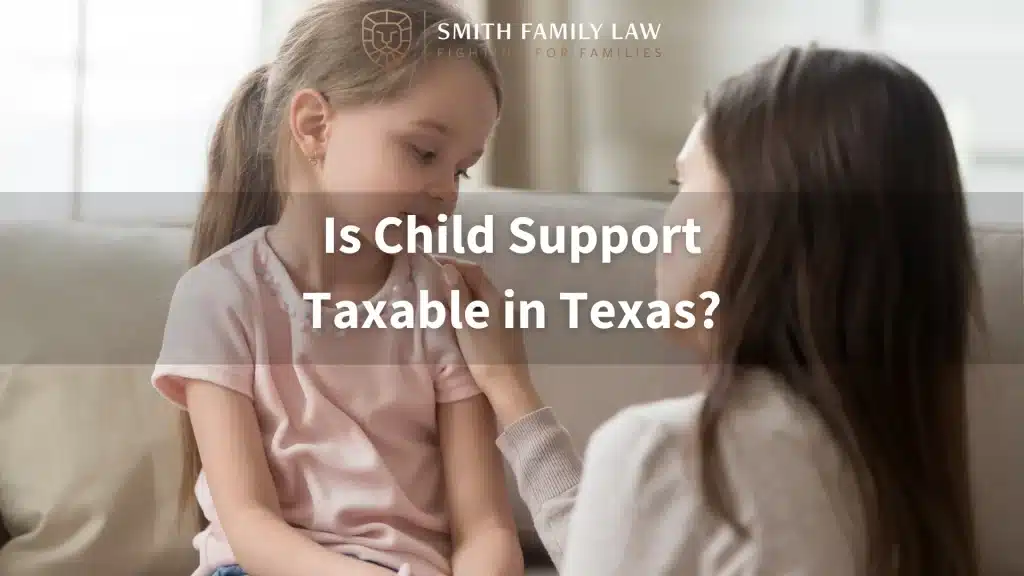
There is more to consider with post-divorce tax filings than just checking the “single” box instead of “married.” Whether you’re the parent receiving child support or the one making the child support payments, there are a few things to know about child support payments when filing your federal taxes. Fortunately, Texas does not assess a state income tax, so the answer to “Is child support taxable in Texas?” is no. However, there are federal tax implications to consider.
Do I Have to Claim Child Support on My Taxes?
You do not have to claim child support on Texas state taxes because there isn’t a state income tax in the Lone Star State. You also don’t have to claim child support payments as income on your federal income tax.
However, if one of the child’s parents is living in a household that receives Supplemental Nutritional Assistance Program benefits (SNAP, formerly known as food stamps), then some of the child support payments you are required to make may be tax deductible. These rules are complex, though, so if you or your child’s other parent receives SNAP, you should consult with a professional about deducting child support payments.
Some parents paying child support may believe that since they are paying part of their income to the child’s other parents, they should deduct that expense from their gross income. After all, they still pay taxes on the gross amount they earn each year, so it’s a fair conclusion to arrive at. But, the payor must still pay taxes on the money they pay out for child support.
Does Child Support Count as Income?
The Internal Revenue Service (IRS) does not consider child support as income for the receiving parent. Nor is child support a tax-deductible expense for the parent paying it. No matter how much you pay, the IRS still views child support as a personal expense and not as a deductible expense.
The purpose of child support is to pay for a child’s needs, from shoes to school fees, food, and a place to live. So, if you were the non-custodial parent, and you purchased shoes, clothes, and food for your child, those expenses would not be tax deductible. Those would be dependent care expenses. It’s the same for the parent receiving child support. They do not subtract the money spent on the child from their taxes, nor do they include child support as income.
This is understandably frustrating if one parent’s income would be in a lower tax bracket if they were able to deduct child support from their gross income. However, there are some expenses you may be able to deduct.
Can I Deduct Medical Expenses from My Taxes?
Some medical expenses may be tax deductible for the parent who pays them, even if that parent isn’t the custodial parent. A parent can claim medical expenses as a deduction if they are itemizing deductions and the medical expenses reach a certain dollar amount. Be sure to retain all medical records, receipts, and statements for the medical expenses you’ve paid and provide them to your tax preparation specialist. They can evaluate these expenses and determine whether you can deduct them from your taxes.
Can Both Divorced Parents Claim Head of Household on Their Taxes?
The IRS permits a parent to claim Head of Household tax benefits if they are married or legally separated if three conditions are met:
- The other spouse didn’t live in your house for the final six months of the calendar year
- Your house was the primary home for the dependent child(ren) for more than half of the calendar year
- You paid for more than half of the household expenses and upkeep for your home for more than half the calendar year
After parents divorce, typically the parent who claims the child can file as Head of Household. However, in cases of shared 50/50 custody, claiming head of household can become more complex. In some situations, both parents may claim Head of Household for their respective households. This can happen if one parent has primary custody of one child, and the other has primary custody of another. In that case, each one could qualify as Head of Household.
However, the IRS may audit your return and ask for supporting information about your dependents and claimed credits, including Head of Household, so it’s best to have a tax professional guide you on this, and on whether your child support payments may be taxable.
Who Claims a Child on Their Taxes with 50/50 Custody?

Assigning child tax deductions to each parent is often part of divorce and child custody negotiations. If you and your ex didn’t include who claims a child as a dependent in your child support and custody arrangement, then you may need to file a formal custody or child support modification.
Tax Implications of Unpaid Child Support in Texas
If you are behind on child support, the state of Texas will report you to the Office of Child Support Enforcement (OCSE), a federal agency responsible for enforcing child support payments. The OCSE sends a list of delinquent child support payers to the IRS, who may use refunds owed to these individuals to satisfy outstanding child support debts.
To collect owed child support, consider involving a lawyer or tax professional.
Do You Need Help with Child Support?
Divorce is a difficult time, but with the help of a skilled Texas divorce lawyer, post-divorce tax time doesn’t have to be a challenge. Are you having difficulty getting child support from your child’s other parent, or navigating whether the child support payments you’ve received are taxable? Are you receiving everything you’re entitled to as the custodial parent?
Contact Smith & Bledsoe Family Law today for a consultation with a compassionate Texas family law attorney. We can explain your rights according to Texas child support guidelines and discuss the tax implications, whether you are the recipient or the payer. Call our team today at (512) 277-3166 or contact us online.
Related Reading: